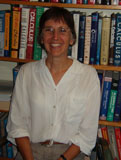2020 CLAS Faculty Awards

UMaine CLAS faculty from the Departments of History, Communications and Journalism, Physics and Astronomy, and Mathematics and Statistics have been announced as 2019-2020 winners of College of Liberal Arts and Sciences Faculty Awards. The awards, presented this year to Liam Riordan, Bridie McGreavy, Sam Hess, and Paula Drewniany, were established to honor faculty contributions in teaching and advising, service and outreach, and research and creative activity, and adjudicated by a panel of peers based on the nominations by colleagues within the College of Liberal Arts and Sciences.
Bridie McGreavy, associate professor of Environmental Communication in the Department of Communication and Journalism, received the Teaching and Advising Award for her work as an inspiring instructor, a consummate advisor, and a role model in the classroom. Her consistent, superb performance as a teacher is impressive, particularly in light of her equally remarkable work as a researcher and as a community service member. A team of nominators described McGreavy’s teaching as “humbling,” highlighting in particular her emphasis on community engagement projects in her classes, to teach students to apply theory to practical issues specific to this region. She takes students to clam in mud flats, to visit dams considered for removal, to meet with Penobscot Nation partners, to simply sit on the Stillwater River and reflect on being present with the environment, and much more.
The 2020 award for Outreach and Service was presented to Liam Riordan, professor of history. Riordan was commended for his commitment to public engagement, including his efforts in May 2019 to host the Maine Statehood and Bicentennial Conference, his early stewardship of the annual Bangor Humanities Day, and his work organizing Maine National History Day—a statewide contest for students in grades 6-12 that annually brings over 350 people to the University of Maine campus. In 2019 alone, Riordan gave over 36 public talks at historical societies and sites around the State of Maine, from Madawaska to Scarborough, expertly weaving general political contexts with specific histories of the towns in which he speaks. As one observer described it, “Dr. Riordan’s work has encouraged the community to think more deeply about their personal histories, connections to one another, and the larger history of statehood and national politics.”
 For her commitment to teaching in Mathematics and Statistics since 2001, Paula Drewniany was presented with the Outstanding Lecturer Award, highlighting her work in the department’s foundational courses such as Precalculus, Calculus I and Calculus II. Drewniany has also been involved in the design of courses (most recently Applications of Calculus) and has played a key role in shifting pedagogical and learning techniques within her department–working closely with the Center for Innovation in Teaching and Learning (CiTL) and the Maine Center for Research in STEM Education (RiSE), and spearheading, for example, a project to deploy experienced undergraduate Maine Learning Assistants to help mentor students in the mathematics classroom.
For her commitment to teaching in Mathematics and Statistics since 2001, Paula Drewniany was presented with the Outstanding Lecturer Award, highlighting her work in the department’s foundational courses such as Precalculus, Calculus I and Calculus II. Drewniany has also been involved in the design of courses (most recently Applications of Calculus) and has played a key role in shifting pedagogical and learning techniques within her department–working closely with the Center for Innovation in Teaching and Learning (CiTL) and the Maine Center for Research in STEM Education (RiSE), and spearheading, for example, a project to deploy experienced undergraduate Maine Learning Assistants to help mentor students in the mathematics classroom.
The College’s award for Research, finally, was presented to Samuel Hess, professor in the Department of Physics and Astronomy, for his groundbreaking work as one of the inventors of super-resolution optical imaging. Hess’s research spans physics, biology, and chemistry, focusing on nanoscale imaging in biological materials. Hess pioneered the field of Fluorescence PhotoActivation Localization Microscopy (FPALM), which produces image resolution for optical microscopy on the order of 100 times better than the limit set by diffraction. This innovation allows real-time imaging of biological systems at a resolution previously available only through electron microscopy, which requires “fixed,” or frozen and sliced, cells. This technique—cited as one of the “Top Ten Scientific Breakthroughs of 2006” by Science magazine and “Method of the year” by the journal Nature Methods—enables scientists to image living cells with unprecedented detail, yielding critical information that can be used for medical research in many realms.
CLAS Faculty Award winners receive a small prize to honor their contributions to the College, the University of Maine, and the community, as well as place of prominence on the walls of Center Stevens Hall. For a complete list of CLAS Award winners dating to their establishment, visit the College of Liberal Arts and Sciences home page.
